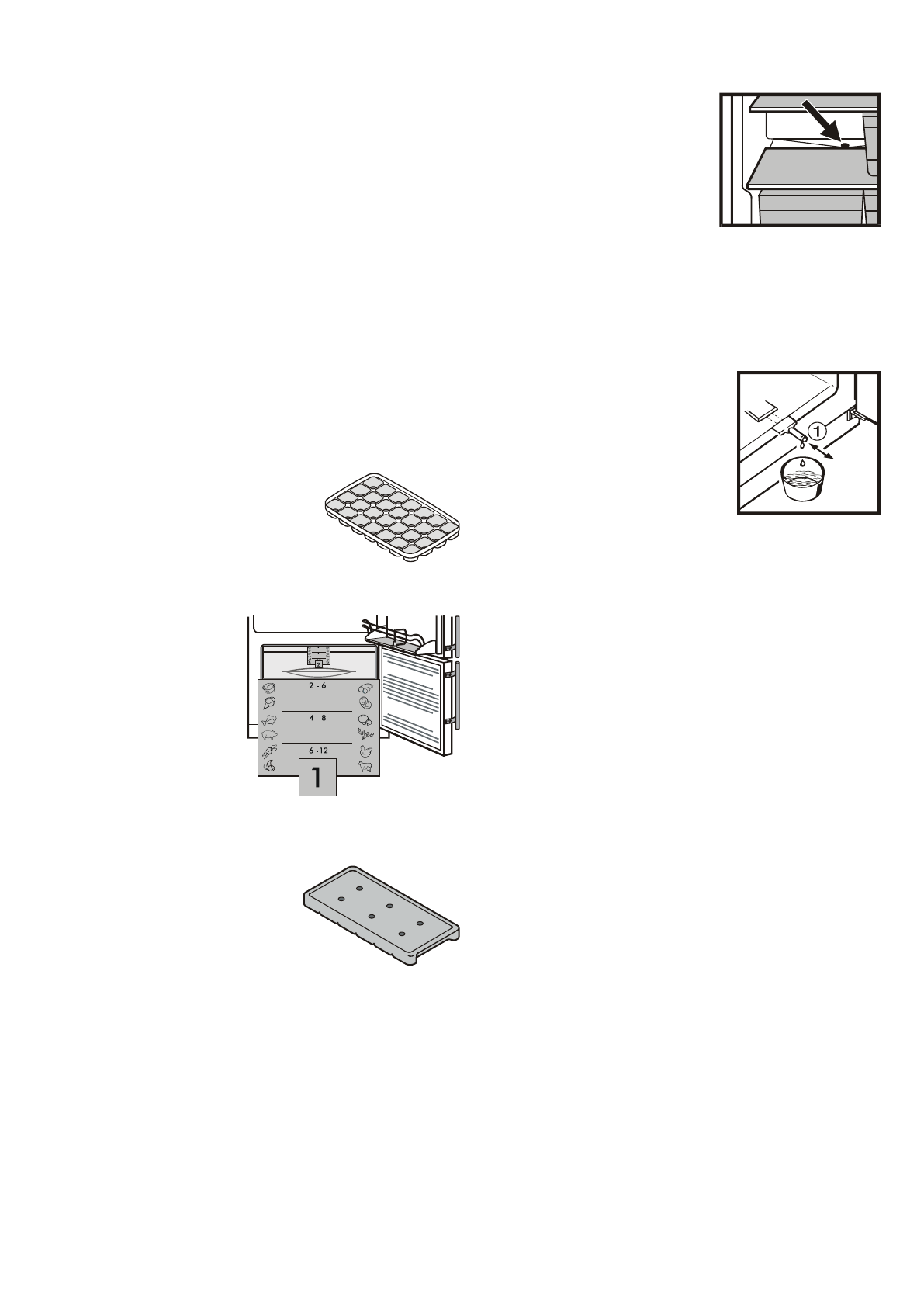Холодильник Liebherr CPesf 4613 Comfort - инструкция пользователя по применению, эксплуатации и установке на русском языке. Мы надеемся, она поможет вам решить возникшие у вас вопросы при эксплуатации техники.
Если остались вопросы, задайте их в комментариях после инструкции.
"Загружаем инструкцию", означает, что нужно подождать пока файл загрузится и можно будет его читать онлайн. Некоторые инструкции очень большие и время их появления зависит от вашей скорости интернета.

11
Notes on freezing and storage
• Pack food which you are freezing yourself in quantities appropriate
to your household. To ensure that the food freezes right through,
the following quantities should not be exeeded per pack age: fruit,
vegetables: up to 1 kg, meat: up to 2,5 kg.
• Pack frozen food in standard freezer bags or reuseable plastic,
metal or aluminium containers.
• Do not allow fresh food which is to be frozen to come into contact
with food already frozen. Always keep packs dry in order to avoid
them sticking together.
• Always write the date and contents on the pack and do not exeed
the stated storage time for the food.
• Do not freeze bottles and cans which contain carbonated drinks
as they might burst.
• Only take out as much food as is immediately required for thawing.
Use food which has been thawed in prepared meals as quickly
as possible.
Frozen food can be thawed in the following ways:
– in a fan oven
– in a microwave oven
– at room temperature
– in the refrigerator: the cold given off by the frozen food is used for
cooling.
GB
Freezing chart
The freezing chart represents
the frozen food and the time
it can be safely stored in
months. The individual stor-
age times and whether or
not the lower or upper value
is applicable depend on the
food quality, its processing
prior to freezing, and the
individual household's qual-
ity requirements. The lower
values always apply to food
with a high fat content.
Cold-storage accumulators
The cold-storage accumulators provided
prevent the temperature in the freezer
from rising too quickly in the event of
a power failure, thus preserving the
quality of the food.
To ensure maximum storage time in the event
of a power failure, place the cold-storage accumula-
tors in the top-most freezer drawer on top of the food.
Making ice cubes
• Fill the ice-cube tray with water.
• Place the ice-cube tray in the appliance
and leave it to freeze.
•
The ice cubes can be removed from the
tray by twisting or by holding upside down for a
short time under running water.
Defrosting
Refrigerator compartment
The refrigerator compartment defrosts
automatically. The water that forms
on the rear wall drains into a reser-
voir at the back of the appliance and
evaporates automatically through the
compressor heat.
Ensure that the water can flow without
hindrance through the hole above the
vegetable bins.
Freezer compartment
After the appliance has been in operation for some time, a layer
of frost or ice will form on the inside walls. This increases energy
consumption. You should therefore defrost the appliance regularly.
• Switch the appliance off to defrost. Pull out the mains plug or set
the temperature control to "0".
• Wrap the frozen food in paper or blankets and store in a cool place.
• Pull out the defrost drain pipe
➊
and
place a bowl underneath.
• To speed up the defrosting process put
a saucepan of hot water on the compart-
ment floor.
• Leave the door of the appliance open
while defrosting. After defrosting mop
up the remaining water and clean the
appliance.
Do not use any mechanical devices or
other artificial aids for defrosting other than those recommended
by the manufactur er.
Cleaning
Before cleaning always switch off the appliance. Pull out the
mains plug or remove/unscrew the fuse.
• Clean the side panels and door surfaces with a clean and soft cloth.
If necessary, use a moist cloth (water + detergent). Alternatively,
use a micro-fibre cloth.
- Do not use abrasive sponges or scourers, do not use concentrated
cleaning agents and never use cleaning agents containing sand,
chloride or acid or chemical solvents, as these would damage the
surfaces and could cause corrosion.
• Clean the inside and equipment parts with lukewarm water and
a little detergent.
Do not use steam cleaners because of the risk of injury and
damage.
• Ensure that no cleaning water penetrates into the electrical com-
ponents or ventilation grille.
• Dry all parts well with a cloth.
• Clean the drain hole in the refrigerator compartment with a thin
object, e.g. cotton swab or the like.
• Do not damage or remove the type plate on the inside of the ap-
pliance. It is very important for servicing purposes.
Характеристики
Остались вопросы?Не нашли свой ответ в руководстве или возникли другие проблемы? Задайте свой вопрос в форме ниже с подробным описанием вашей ситуации, чтобы другие люди и специалисты смогли дать на него ответ. Если вы знаете как решить проблему другого человека, пожалуйста, подскажите ему :)




















